Can Cats Eat Eggplant? Everything You Need to Know
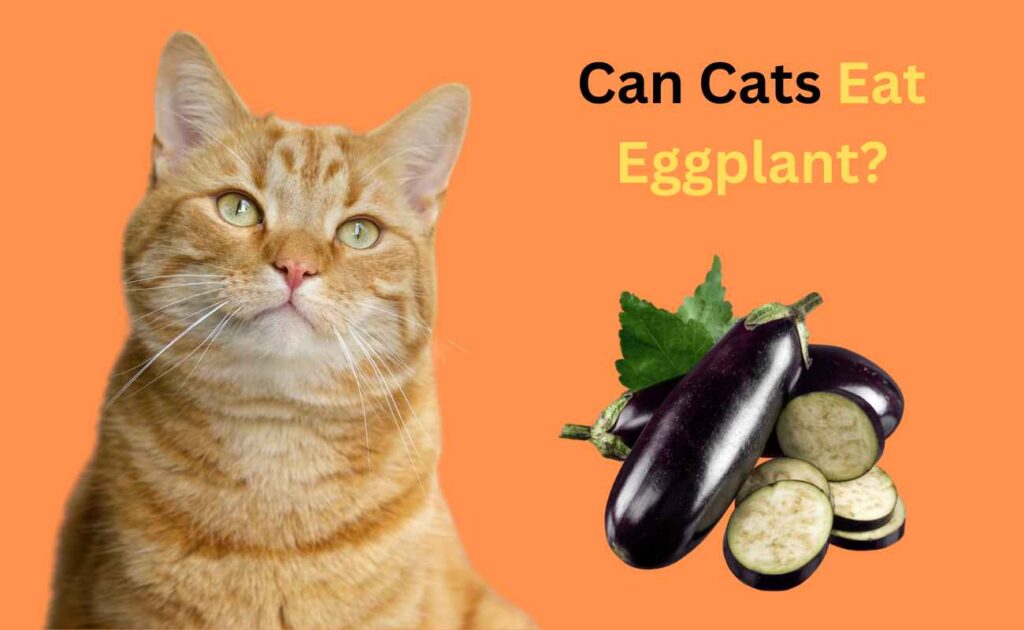
Cats are known for their curious and often quirky eating habits. As a pet owner, you want to ensure your feline friend is eating safe and healthy foods. One question that may arise is whether cats can eat eggplant. While eggplant is a common ingredient in many human dishes, it’s crucial to understand whether it’s safe or harmful for your furry companion. This article will explore the ins and outs of eggplant consumption for cats, including its potential risks, nutritional content, and expert recommendations. What Is Eggplant? Before diving into whether cats can eat eggplant, let’s first understand what eggplant is. Also known as aubergine, eggplant is a vegetable that belongs to the nightshade family (Solanaceae), which includes tomatoes, potatoes, and bell peppers. It comes in various shapes, sizes, and colors, but the most common type is the large, purple variety. Eggplants are packed with nutrients like fiber, vitamins, and antioxidants that are beneficial to humans. However, just because a vegetable is healthy for humans doesn’t mean it’s safe for cats. Signs and Symptoms of Solanine Poisoning in Cats If your cat has ingested eggplant, you should be on the lookout for symptoms of solanine poisoning. These symptoms typically appear within a few hours of consumption and can include: Vomiting and diarrhea: Solanine irritates the digestive system, leading to gastrointestinal distress. Lethargy: A cat may become unusually tired or weak. Tremors and seizures: In severe cases, solanine can affect the nervous system, leading to muscle tremors or even seizures. Drooling: An increase in salivation may indicate distress or nausea. Disorientation and confusion: Neurological symptoms can cause a cat to appear disoriented. If you suspect your cat has eaten eggplant and is displaying any of these symptoms, contact your veterinarian immediately. Solanine poisoning can be life-threatening if not treated promptly. What About Cooked Eggplant? Some pet owners may wonder if cooking eggplant reduces its toxicity enough to make it safe for cats. While cooking eggplant does lower the solanine content, it doesn’t eliminate the risk entirely. Cats have small, sensitive digestive systems, and even trace amounts of harmful chemicals can lead to health problems. In addition, cooked eggplant is often prepared with spices, oils, and other ingredients that are also harmful to cats. Garlic, onions, and salt, common seasonings used in eggplant dishes, are toxic to cats and can cause severe health issues, including anemia and high blood pressure. Nutritional Needs of Cats: Why Eggplant Isn’t a Good Fit Cats are obligate carnivores, which means their diet must consist primarily of meat. They rely on animal-based proteins and fats for energy and essential nutrients like taurine, arginine, and arachidonic acid. While vegetables like eggplant contain fiber and antioxidants, they don’t provide the nutrients a cat needs to thrive. Feeding your cat vegetables like eggplant can also cause digestive upset, as their bodies aren’t designed to break down plant matter effectively. Cats lack the enzymes needed to process high-fiber foods, leading to bloating, gas, and discomfort. What To Do if Your Cat Eats Eggplant If your cat accidentally consumes eggplant, take immediate action. Even if they only ingest a small piece, it’s important to monitor them closely for any signs of distress. Contact your veterinarian as soon as possible. They may recommend bringing your cat in for an examination or administering activated charcoal to absorb any toxins. Monitor your cat for symptoms like vomiting, diarrhea, or lethargy. Keep a close eye on their behavior for the next 24–48 hours. Remove any remaining eggplant to prevent further consumption. While eggplant poisoning can be serious, prompt treatment can make all the difference in your cat’s recovery. Conclusion: Should You Let Your Cat Eat Eggplant? In conclusion, eggplant is not a safe or suitable food for cats. The presence of solanine makes it toxic, and its nutritional profile doesn’t align with the dietary needs of obligate carnivores like cats. Whether raw, cooked, or prepared in a dish, it’s best to keep eggplant off your cat’s plate. Instead, focus on providing your cat with a balanced diet that includes high-quality cat food, plenty of protein, and the occasional safe treat. By being mindful of what your cat consumes, you’ll ensure they live a long, healthy, and happy life. If you ever have any doubts about what foods are safe for your pet, don’t hesitate to consult with your veterinarian. Their expertise can guide you in making the best choices for your furry friend.
Can Cats Have Lemon?
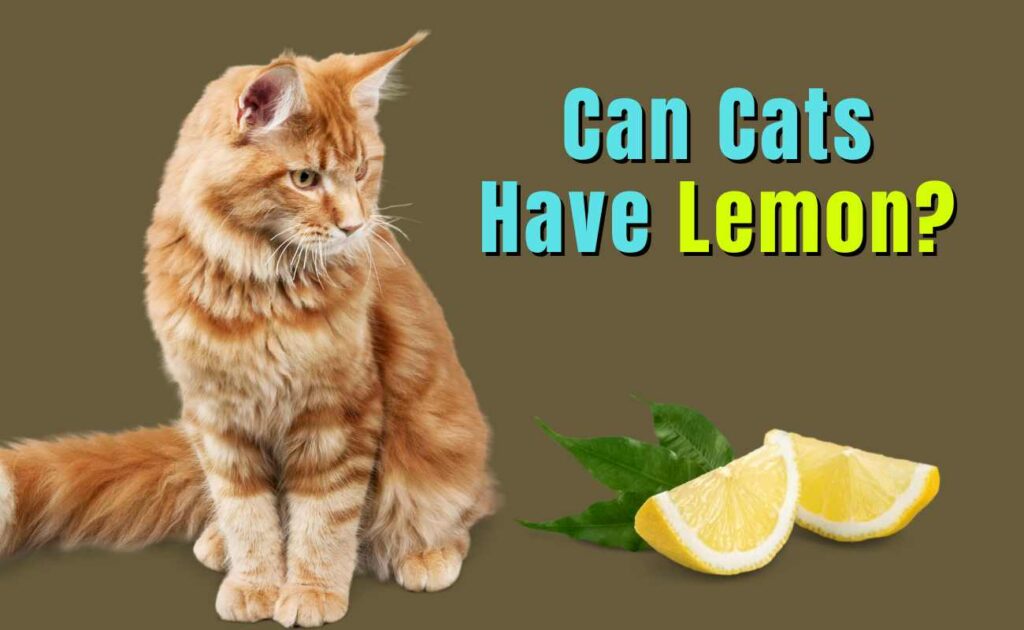
As cat owners, we often find ourselves curious about what human foods are safe for our feline friends. With their curious nature and penchant for exploring, it’s not uncommon for a cat to come across something unusual in our kitchens. One such item that might spark curiosity is lemon. You might wonder, “Can cats have lemon?” Let’s dive into this question and explore why lemons are best kept out of reach from our furry companions. What Is Lemon and Why the Curiosity? Lemons are citrus fruits that are commonly used in a variety of human foods and drinks. Known for their tangy flavor and bright yellow color, lemons are a staple in many kitchens. They’re often used to add a zesty kick to dishes, to make lemonade, or even as a garnish. Given their ubiquity in our lives, it’s natural for cat owners to wonder if this seemingly innocuous fruit could be safe for their pets. Can Cats Eat Lemon? The short answer is no, cats should not eat lemons. While lemons are perfectly safe and even beneficial for humans in moderation, they pose several risks to cats. Lemons contain several compounds that can be harmful to felines, primarily citric acid and essential oils like limonene. Let’s break down why these substances are problematic for cats. The Harmful Compounds in Lemons Citric Acid: Citric acid is the primary acid found in lemons and other citrus fruits. It gives lemons their distinctive sour taste. For humans, citric acid is generally safe and can even help with digestion. However, for cats, it can cause gastrointestinal upset. Cats have more sensitive stomachs compared to humans, and even small amounts of citric acid can lead to symptoms such as vomiting and diarrhea. Essential Oils (Limonene): Lemons also contain essential oils like limonene, which is responsible for the fruit’s strong, pleasant scent. While limonene is often used in household cleaners and perfumes for its fresh aroma, it is not safe for cats. Essential oils can be very toxic to cats when ingested or even inhaled in concentrated amounts. They can cause severe reactions, including liver damage and respiratory distress. What to Do If Your Cat Ingests Lemon If you suspect that your cat has eaten lemon or any other potentially harmful substance, it’s important to act promptly: 1. Observe Your Cat: Monitor your cat closely for any signs of distress or unusual behavior. Look for symptoms like vomiting, diarrhea, or lethargy. 2. Contact Your Veterinarian: Reach out to your vet immediately for advice. Provide details about the amount of lemon your cat may have consumed and any symptoms you’ve observed. 3. Follow Veterinary Instructions: Your vet may suggest bringing your cat in for an examination or may provide guidance on managing mild symptoms at home. It’s crucial to follow their instructions carefully to ensure your cat’s well-being. 4. Avoid Home Remedies: Do not attempt to treat your cat with home remedies or over-the-counter medications without veterinary guidance, as this could worsen the situation. Conclusion In conclusion, while lemons are a delightful and tangy addition to human cuisine, they are not suitable for our feline friends. The citric acid and essential oils in lemons can cause gastrointestinal upset and other health issues in cats. It’s important to keep lemons and other potentially harmful foods out of your cat’s reach and to be vigilant about what they might ingest. By offering safe and healthy alternatives, you can ensure that your cat enjoys a happy and healthy diet. If you ever have concerns about what your cat eats, don’t hesitate to seek advice from your veterinarian. Your cat’s health and safety are paramount, and a little caution can go a long way in keeping them well.
Can Dogs Eat Sauerkraut? A Complete Guide for Dog Owners
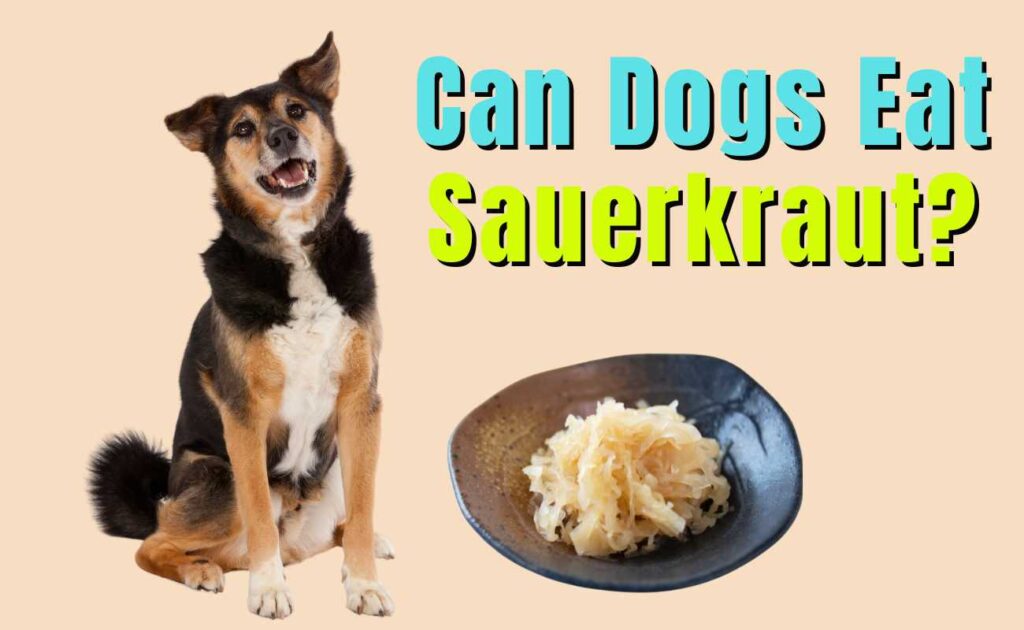
As a dog owner, you always want the best for your furry friend. Whether it’s finding the healthiest treats or introducing new foods, their well-being is your top priority. You might have wondered if it’s safe to share some of your favorite human foods with your dog—like sauerkraut. So, can dogs eat sauerkraut? Let’s dive into what sauerkraut is and whether it’s safe for your dog to enjoy. What is Sauerkraut? Sauerkraut is a type of fermented cabbage that’s known for its tangy flavor. The word “sauerkraut” comes from German, meaning “sour cabbage.” It’s made by fermenting cabbage with lactic acid bacteria, a process that not only gives sauerkraut its unique taste but also adds some health benefits for humans. Rich in probiotics and nutrients, sauerkraut is a popular choice for many looking to add more flavor and health benefits to their meals. Is Sauerkraut Safe for Dogs? The good news is that sauerkraut can be safe for dogs to eat in small amounts. However, there are some things to keep in mind before you start sharing your sauerkraut with your pup. The main concern with sauerkraut is its high salt content, which can be harmful to dogs in large amounts. Another thing to consider is that sauerkraut is a fermented food, which means it might not be suitable for all dogs, especially those with sensitive stomachs. Health Benefits of Sauerkraut for Dogs If your dog enjoys the taste and has no adverse reactions, sauerkraut can offer some surprising health benefits. Probiotics for Better Digestion: Sauerkraut is rich in probiotics, which are good bacteria that help keep the gut healthy. These probiotics can aid in digestion and support your dog’s overall gut health, potentially reducing issues like diarrhea and constipation. Vitamins and Minerals: Sauerkraut contains several important vitamins and minerals, including vitamin C and vitamin K, which are beneficial for your dog’s immune system and bone health. Antioxidants: The fermentation process increases the levels of antioxidants in sauerkraut, which can help fight off harmful free radicals in your dog’s body, promoting better overall health. Homemade Sauerkraut vs. Store-Bought: Which is Better? When it comes to choosing between homemade and store-bought sauerkraut, homemade is generally the safer option for dogs. Homemade sauerkraut allows you to control the ingredients, ensuring there’s no added salt, spices, or preservatives that could harm your dog. On the other hand, store-bought sauerkraut often contains added ingredients that may not be suitable for dogs. However, if you opt for store-bought sauerkraut, make sure to read the label carefully. Choose a brand that has minimal ingredients, preferably just cabbage and a small amount of salt, and avoid any with added spices like onion or garlic. Signs Your Dog Should Avoid Sauerkraut While sauerkraut can be a tasty treat for some dogs, it’s not suitable for all. Here are some signs that your dog might need to avoid sauerkraut: Allergic Reactions: If your dog shows signs of an allergic reaction, such as itching, swelling, or difficulty breathing, after eating sauerkraut, stop feeding it to them immediately. Gastrointestinal Issues: If your dog experiences vomiting, diarrhea, or excessive gas after eating sauerkraut, it may not be a good choice for them. Pre-existing Conditions: Dogs with certain health conditions, like kidney disease or heart problems, should avoid high-salt foods like sauerkraut. Always consult your vet if you’re unsure about introducing new foods to your dog’s diet. Conclusion In moderation, sauerkraut can be a safe and healthy addition to your dog’s diet. It offers several health benefits, including probiotics for digestion and essential vitamins and minerals. However, it’s important to be mindful of the risks, such as high salt content and potential stomach upset. By choosing plain sauerkraut and introducing it slowly, you can see if your dog enjoys this tangy treat without any issues. Remember, every dog is different, so always consult with your vet before introducing any new foods to your dog’s diet.
Can Dogs Eat Eggplant?

As dog owners, we all want to make sure our furry friends enjoy a healthy diet. With so many foods out there, it’s important to know which ones are safe for our dogs. One common question is, “Can dogs eat eggplant?” This popular vegetable is often seen in our meals, but is it a good choice for your pet? In this article, we’ll explore everything you need to know about feeding eggplant to dogs. What is Eggplant? Eggplant, also known as aubergine, is a versatile vegetable often used in various cuisines around the world. It has a glossy, dark purple skin and a spongy texture inside. Eggplants are commonly found in dishes like ratatouille, moussaka, and eggplant parmesan. They are known for being rich in vitamins and minerals, making them a healthy choice for humans. But just because something is healthy for us doesn’t mean it’s safe for our pets. Let’s find out if eggplant is a good choice for dogs. Is Eggplant Safe for Dogs? The short answer is yes, eggplant is generally safe for dogs to eat in moderation. However, like with many human foods, there are some important things to consider before feeding eggplant to your dog. While the flesh of the eggplant is not toxic to dogs, certain parts of the plant, such as the leaves and stems, contain solanine, a chemical that can be harmful in large amounts. Solanine is also found in other nightshade vegetables like tomatoes and potatoes. If your dog eats a large amount of these parts, they may experience symptoms like vomiting or diarrhea. Health Benefits of Eggplant for Dogs If fed in moderation, eggplant can offer some health benefits for your dog. Here are a few: Rich in Vitamins and Minerals: Eggplant contains vitamins such as B6, K, and C, which can support your dog’s immune system and overall health. It also provides essential minerals like potassium and magnesium. High in Fiber: The fiber in eggplant can help support a healthy digestive system for dogs. Fiber aids in digestion and can help prevent constipation. Low in Calories: Eggplant is low in calories, making it a great option for dogs who need to maintain a healthy weight. It can be a tasty, low-calorie treat that doesn’t add extra pounds. Antioxidants: Eggplant is rich in antioxidants, particularly nasunin, which is found in the skin. Antioxidants can help protect your dog’s cells from damage caused by free radicals. How to Safely Serve Eggplant to Your Dog If you decide to give your dog eggplant, there are a few steps you can take to ensure it’s safe and enjoyable for them: Cook it Plain: Always cook eggplant before giving it to your dog. Raw eggplant can be tough on their digestive system and is more likely to cause an upset stomach. Cook it plain without any added spices, oils, or seasonings. Grilling or baking is a good way to prepare it. Remove Harmful Parts: Make sure to remove any leaves and stems from the eggplant before serving it to your dog. These parts contain solanine, which is harmful in large amounts. Serve in Small Portions: Start with a small piece of cooked eggplant to see how your dog reacts. This way, you can monitor them for any adverse reactions. If your dog enjoys it and has no negative effects, you can occasionally offer eggplant as a treat. Avoid Fried or Seasoned Eggplant: Many eggplant dishes we enjoy, like eggplant parmesan, contain added ingredients such as cheese, oil, and seasonings that are not suitable for dogs. Stick to plain, cooked eggplant. Conclusion In conclusion, dogs can eat eggplant, but it should be given in moderation and prepared properly. Make sure to cook it plain, remove any harmful parts, and watch for any signs of a negative reaction. While eggplant can offer some health benefits, there are also risks to be aware of. If you have any doubts, it’s always best to consult with your veterinarian before introducing new foods to your dog’s diet.
Can Dogs Eat Black Olives? What Every Dog Owner Should Know

Have you ever found your dog staring at that juicy black olive on your plate? As a pet parent, one can’t help but wonder if this little treat can also be shared with our fur babies. Dogs are curious creatures, and their inquisitiveness toward human food leaves us pondering about safety. This post tackles the question of whether dogs can actually eat black olives, if they love them, and the related health benefits and risks. Do Dogs Love Olives? Just as not every dog will enjoy the same food, it is also true that all dogs are different in their choices. Some may sniff an olive and walk away from it, while others eat them greedily if allowed. Why do some dogs love olives? One cause can be its smell. Olives have a distinctive aroma that can be appealing to some dogs. They have some fats and oils that can draw a dog’s attention, leading them to think it is something tasty. The texture might also be a factor, as some dogs enjoy the chewy consistency of olives. However, it’s very important to remember that just because a dog likes something doesn’t necessarily mean it’s good for them. This brings us to the next question: are black olives safe for dogs? Health Benefits of Black Olives for Dogs Some of the health benefits of black olives include: Being a great source of antioxidants. Black olives are high in antioxidants, which help to protect your dog’s body from oxidative stress. By incorporating antioxidant-rich foods into your dog’s diet, you’ll be supporting their general health and well-being. Heart Health The nice fats in black olives, mainly the monounsaturated fats, can help your dog’s heart. They can effectively reduce bad cholesterol levels, hence lowering the risk of heart disease. Although not demanding a high percentage of fat in the food like people do, including small amounts of healthy fat in the diet can be suitable for dogs. Moderation is Key While black olives can be nutritious, remember this means they are only to be used in small amounts. If too many olives are given, this may lead to weight gain along with digestive and other health issues. Always monitor the dog when introducing it to a new type of food and when making changes in its diet. How Many Black Olives Can Dogs Eat Per Day? So, how many black olives should you give your dog daily? Well, the answer will depend on your dog’s health and age. For now, here is what experts advise: The number of servings Small dogs will probably have enough of just one or two olives daily. Bigger dogs may be able to get away with having a few more, but portion size should still be small. A general rule is that olives should be considered a treat and not be fed every day as part of your dog’s diet. Daily Limits On average, limit the number you give your dog to no more than two to four olives per day, depending on their size. This will help ensure that it isn’t too much sodium or fat. If your dog has obesity, kidney, or any other health problem, then the ideal thing is to avoid feeding olives altogether or take advice from a vet. Monitor reactions: When you first feed olives to your dog, monitor the pet for any signs of allergic reactions or tummy upsets. These may be vomiting, diarrhea, or changes in behavior. As mentioned, in case you see any of those symptoms, stop giving your dog olives and call your vet. Conclusion Black olives can, therefore, be a safe and healthy treat in moderation for dogs. Although some dogs may seem to love the taste and texture of olives, it is wise to mind the potential risks of high sodium content and choking hazards. Ensure they are plain, unsalted olives, and remove the pits before giving them to your dog. After all, every dog is an individual, so what’s safe for one may not be safe for another. If you are concerned about feeding black olives, or any human food, to your dog, consult a veterinarian in order to ensure that your best friend will remain healthy and happy while indulging in treats here and there.
Can Cats Eat Guava?
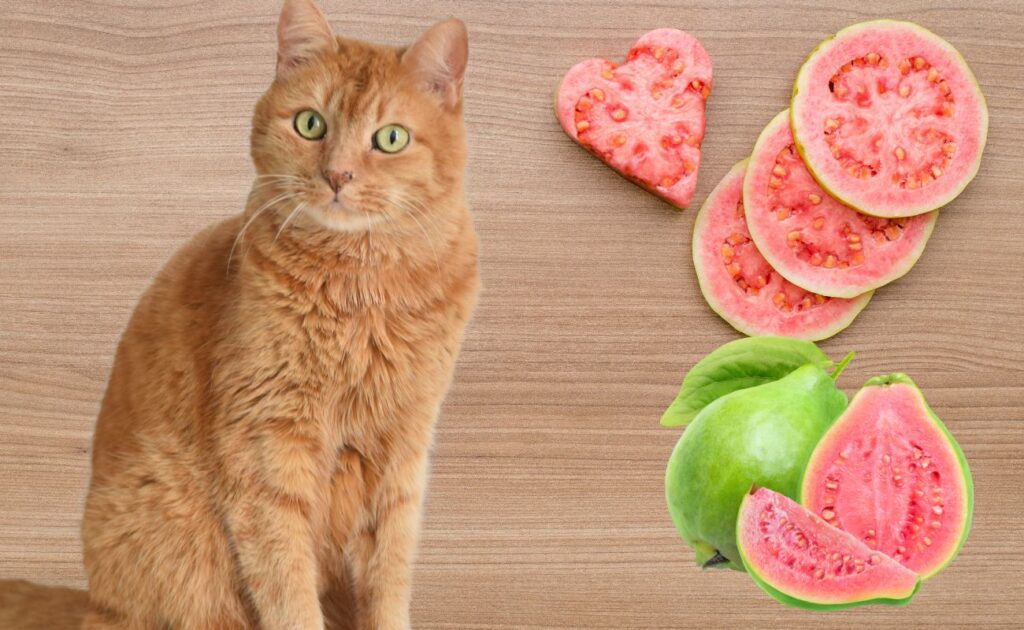
Cats are known for being picky eaters, and their diet mainly consists of meat. Unlike humans, who can eat a variety of foods, cats have specific dietary needs to stay healthy. While it’s normal to wonder if you can share some of your fruits with your cat, it’s important to know which ones are safe and which ones might be harmful. Understanding what fruits are safe for cats can help you avoid any health risks and keep your cat happy and healthy. What is Guava? Guava is a tropical fruit known for its sweet and tangy flavor. It is rich in nutrients like vitamin C, fiber, and antioxidants, making it popular for its health benefits. There are different types of guava, including pink, white, and yellow varieties, each with a slightly different taste and texture. Can Cats Eat Guava? Yes, cats can eat small amounts of guava, but it should only be given as an occasional treat. While guava is not toxic to cats, it doesn’t provide any significant nutritional benefits for them. It’s important to avoid giving them guava seeds or too much fruit, as it could upset their stomach. Nutritional Benefits of Guava Guava contains several nutrients that can be beneficial for cats. Here are some potential advantages: Vitamin C: Although cats produce their own vitamin C, the additional intake from guava can boost their immune system and improve overall health. Fiber: Guava’s high fiber content can aid in digestion and prevent constipation in cats. Antioxidants: These help in combating free radicals, potentially reducing the risk of chronic diseases and promoting longevity. Despite these benefits, it’s important to feed guava to cats in moderation to avoid any adverse effects. Here’s a table of the complete nutritional profile of guava per 100 grams: Nutrient Amount Calories 68 kcal Carbohydrates 14.32 g Sugars 8.92 g Dietary Fiber 5.4 g Protein 2.55 g Total Fat 0.95 g Saturated Fat 0.272 g Monounsaturated Fat 0.087 g Polyunsaturated Fat 0.401 g Vitamin A 624 IU Vitamin C 228.3 mg Vitamin E 0.73 mg Vitamin K 2.6 µg Thiamine (B1) 0.067 mg Riboflavin (B2) 0.040 mg Niacin (B3) 1.084 mg Vitamin B6 0.110 mg Folate (B9) 49 µg Pantothenic Acid 0.451 mg Calcium 18 mg Iron 0.26 mg Magnesium 22 mg Phosphorus 40 mg Potassium 417 mg Sodium 2 mg Zinc 0.23 mg Copper 0.230 mg Manganese 0.150 mg Selenium 0.6 µg This nutritional profile highlights the rich content of vitamins, minerals, and fiber in guava, making it a healthy fruit option. Is Guava Okay for Cats? Guava can be okay for cats in small amounts, but it doesn’t offer significant nutritional benefits for them. While guava is rich in vitamin C, fiber, and other nutrients, cats get all the essential vitamins and minerals they need from their regular meat-based diet. Unlike humans, cats don’t need extra vitamin C because their bodies produce it naturally. Possible Risks: Digestive Upset: Too much guava can cause stomach issues, like diarrhea or vomiting, due to its high fiber and sugar content. Seeds: Guava seeds could pose a choking hazard or cause digestive blockages if swallowed. Recommendations: Portion Size: If you decide to give your cat guava, offer only a small piece, roughly the size of a fingernail. Frequency: Limit it to an occasional treat, not a regular part of their diet. Are Guava Plants Poisonous to Cats? Guava plants are generally not considered poisonous to cats, but they still pose some risks. The leaves, seeds, and other parts of the plant are not toxic, but they can cause problems if ingested in large amounts. Potential Risks: Seeds: The seeds of the guava can be a choking hazard and might cause digestive blockages if swallowed by a cat. Leaves: If a cat chews on guava leaves, it could lead to mild stomach upset or digestive discomfort. Stems and Bark: While not toxic, chewing on stems or bark could cause irritation or damage to a cat’s mouth. Precaution: Even though guava plants aren’t poisonous, it’s best to keep them out of reach of your cat to avoid any potential issues. Summary: Can Cats Eat Guava? In summary, while guava is not toxic to cats, it doesn’t provide any essential nutrients that they need. Cats can eat small amounts of guava as an occasional treat, but it should not be a regular part of their diet. The high fiber and sugar content in guava can cause digestive issues if consumed in excess, and the seeds could be a choking hazard or cause blockages. Final Advice: If you choose to give your cat guava, do so in very small portions and only occasionally. Always remove the seeds and monitor your cat for any signs of discomfort. Remember, a cat’s diet should mainly consist of high-quality cat food that meets all their nutritional needs.
Can Dogs Eat Guava?

When it comes to feeding our furry friends, pet owners often wonder about the safety of various human foods. One such query that frequently arises is, “Can dogs eat guava?” Guava is a tropical fruit known for its delicious taste and nutritional benefits for humans. But is it safe for dogs? In this blog post, we’ll explore whether guava is safe for dogs, the potential benefits and risks, and how to safely introduce it into your dog’s diet. Nutritional Benefits of Guava Guava is packed with vitamins and minerals that are beneficial to humans, and some of these benefits extend to dogs as well. This tropical fruit is rich in Vitamin C, which supports immune health, and Vitamin A, which is essential for good vision. Additionally, guava contains dietary fiber, promoting healthy digestion, and a variety of antioxidants that help combat free radicals. These nutrients can contribute positively to your dog’s overall health when given in moderation. Here’s a table of the complete nutritional profile of guava per 100 grams: Nutrient Amount Calories 68 kcal Carbohydrates 14.32 g Sugars 8.92 g Dietary Fiber 5.4 g Protein 2.55 g Total Fat 0.95 g Saturated Fat 0.272 g Monounsaturated Fat 0.087 g Polyunsaturated Fat 0.401 g Vitamin A 624 IU Vitamin C 228.3 mg Vitamin E 0.73 mg Vitamin K 2.6 µg Thiamine (B1) 0.067 mg Riboflavin (B2) 0.040 mg Niacin (B3) 1.084 mg Vitamin B6 0.110 mg Folate (B9) 49 µg Pantothenic Acid 0.451 mg Calcium 18 mg Iron 0.26 mg Magnesium 22 mg Phosphorus 40 mg Potassium 417 mg Sodium 2 mg Zinc 0.23 mg Copper 0.230 mg Manganese 0.150 mg Selenium 0.6 µg This nutritional profile highlights the rich content of vitamins, minerals, and fiber in guava, making it a healthy fruit option. Is Guava Safe for Dogs? The short answer is yes, dogs can eat guava. However, it’s crucial to understand that not all parts of the guava are safe for your canine companion. The flesh of the guava fruit is generally safe and can be a tasty treat for your dog. On the other hand, the seeds and skin might pose risks. Guava seeds can be a choking hazard and potentially cause intestinal blockages, while the skin might be tough for some dogs to digest. Always remove the seeds and skin before offering guava to your dog. Potential Health Benefits of Guava for Dogs Including guava in your dog’s diet can offer several health benefits. Here are some of the potential advantages: Boosts Immune System: The high Vitamin C content in guava can help strengthen your dog’s immune system, making them more resilient to infections and illnesses. Improves Digestive Health: The dietary fiber in guava aids in digestion and can help prevent constipation in dogs. Enhances Vision and Skin Health: Vitamin A in guava supports good vision and promotes healthy skin and coat. Antioxidant Properties: The antioxidants present in guava help in neutralizing free radicals, reducing the risk of chronic diseases. Risks and Precautions While guava can be beneficial, there are some risks and precautions to consider. First and foremost, always introduce any new food to your dog’s diet gradually. Start with small amounts of guava to ensure your dog doesn’t have any adverse reactions. Overconsumption of guava can lead to stomach upset, diarrhea, or even allergic reactions in some dogs. Additionally, ensure that the guava is fresh and free from any additives or preservatives that might harm your dog. How to Safely Feed Guava to Your Dog To safely feed guava to your dog, follow these steps: Choose Ripe Guava: Select ripe, fresh guava without any signs of mold or spoilage. Wash Thoroughly: Wash the guava thoroughly to remove any pesticides or dirt. Peel and Remove Seeds: Peel the guava and remove all seeds to prevent choking and intestinal blockage. Cut into Small Pieces: Cut the guava flesh into small, manageable pieces that are easy for your dog to chew and swallow. Serve in Moderation: Offer guava as an occasional treat, not as a regular part of your dog’s diet. Can Dogs Eat Guava Leaves? Another common question is whether dogs can eat guava leaves. Guava leaves are known for their medicinal properties in humans, but they are not recommended for dogs. The leaves contain compounds that might be toxic to dogs if ingested in large quantities. It’s best to avoid giving your dog guava leaves and stick to the fruit’s flesh. Signs of Allergic Reaction or Intolerance Even though guava is generally safe for dogs, it’s essential to monitor your pet for any signs of allergic reaction or food intolerance. Symptoms to watch out for include: Vomiting Diarrhea Itching or skin irritation Swelling of the face or paws Difficulty breathing If you notice any of these symptoms after feeding your dog guava, stop immediately and consult your veterinarian. Summary: Can Dogs Eat Guava? In conclusion, dogs can eat guava safely when given in moderation and with proper preparation. This tropical fruit can offer several health benefits, including boosted immunity, improved digestion, and enhanced vision. However, it’s essential to remove the seeds and skin and introduce guava gradually into your dog’s diet. Always monitor for any adverse reactions and consult your veterinarian if you have any concerns. By taking these precautions, you can share the delicious and nutritious benefits of guava with your furry friend. Final Thoughts Feeding your dog human foods can be a fun way to share your meals and provide variety in their diet. However, it’s crucial to ensure the foods you choose are safe and beneficial for your pet. With the right approach, guava can be a healthy and tasty treat for your dog. Remember, the key is moderation and proper preparation. Happy feeding! By optimizing this blog post with the target keyword “can dogs eat guava?” and providing valuable information, it can help pet owners make informed decisions about their dog’s diet while also improving the visibility of the content in search engines.
Can Cats Eat Dragon Fruit?
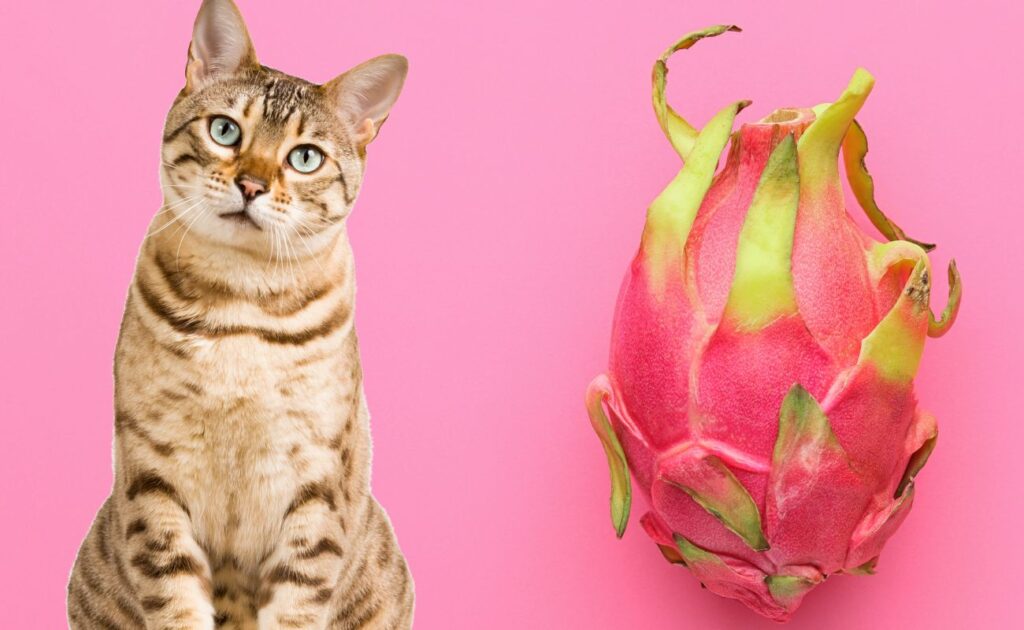
As cat owners, we always strive to provide the best for our feline friends. This includes a healthy diet that sometimes makes us wonder if certain human foods are safe for cats. One such food is dragon fruit. But, can cats eat dragon fruit? This comprehensive guide aims to answer this question and provide additional insights into feeding dragon fruit to your cat. What is Dragon Fruit? Can Cats Eat Dragon Fruit? Dragon fruit, also known as pitaya, is a tropical fruit that has gained popularity due to its vibrant color and numerous health benefits. It is rich in vitamins, minerals, and antioxidants, making it a nutritious addition to a human diet. The fruit has a unique appearance, with a bright pink or yellow skin and speckled flesh that can be white or red. But how does this exotic fruit fare when it comes to our feline companions Can Cats Eat Dragon Fruit? The short answer is yes, cats can eat dragon fruit in moderation. Dragon fruit is non-toxic to cats, which means it won’t cause poisoning or serious harm if ingested. However, it’s important to remember that cats have different dietary needs than humans. While dragon fruit is safe for cats, it should not become a staple in their diet. Instead, it should be offered as an occasional treat. Nutritional Benefits of Dragon Fruit Here is a table of the complete nutritional profile of dragon fruit per 100 grams: Nutrient Amount per 100g Calories 50 kcal Carbohydrates 11 g Dietary Fiber 3 g Sugars 8 g Protein 1.1 g Fat 0.4 g Vitamin C 20.5 mg Vitamin A 1 µg Calcium 18 mg Iron 0.74 mg Magnesium 40 mg Phosphorus 22 mg Potassium 170 mg Sodium 1 mg Vitamin B1 (Thiamine) 0.04 mg Vitamin B2 (Riboflavin) 0.05 mg Vitamin B3 (Niacin) 0.16 mg Vitamin E 0.08 mg Water 90.5 g This nutritional profile highlights the key vitamins, minerals, and macronutrients found in dragon fruit, emphasizing its low-calorie content and rich supply of essential nutrients Health Benefits of Dragon Fruit for Cats Even though cats are obligate carnivores and derive most of their nutrition from meat, they can still benefit from the occasional fruit treat. Dragon fruit is high in fiber, which can aid in digestion and help prevent constipation. It also contains vitamins C and B, as well as antioxidants that can boost your cat’s immune system. However, the amount of these nutrients that your cat can absorb from a small serving of dragon fruit is minimal compared to their daily dietary requirements. Potential Risks of Feeding Dragon Fruit to Cats While dragon fruit is generally safe for cats, there are a few potential risks to be aware of. Firstly, the high fiber content, while beneficial in small amounts, can lead to digestive upset if consumed in large quantities. Secondly, dragon fruit contains sugar, which cats do not need in their diet. Excessive sugar intake can lead to weight gain and other health issues. Lastly, always ensure the dragon fruit is free of pesticides and thoroughly washed before offering it to your cat. How to Safely Introduce Dragon Fruit to Your Cat If you decide to give dragon fruit to your cat, start with a small piece to see how they react. Monitor your cat for any signs of digestive upset, such as vomiting or diarrhea. If they seem to enjoy the fruit and show no adverse reactions, you can continue to offer it as an occasional treat. Always remove the skin and seeds, as these can be difficult for your cat to digest. Alternatives to Dragon Fruit for Cats If your cat doesn’t take to dragon fruit, there are other fruits that are safe and beneficial for cats. Small pieces of apple, blueberry, or cantaloupe can make great treats. Always remember to remove any seeds or pits and introduce new foods slowly to monitor for any adverse reactions. Summary: Can Cats Eat Dragon Fruit? In conclusion, while cats can eat dragon fruit, it should be given in moderation and not replace their regular diet. The primary focus of a cat’s diet should be high-quality cat food that meets their nutritional needs. Dragon fruit can be a fun and occasional treat that provides some additional nutrients and variety to their diet. Always consult with your veterinarian before introducing any new foods to ensure it’s safe for your specific cat. By being informed and cautious, you can enjoy sharing this vibrant fruit with your feline friend without compromising their health.
Can Dogs Eat Dragon Fruit?
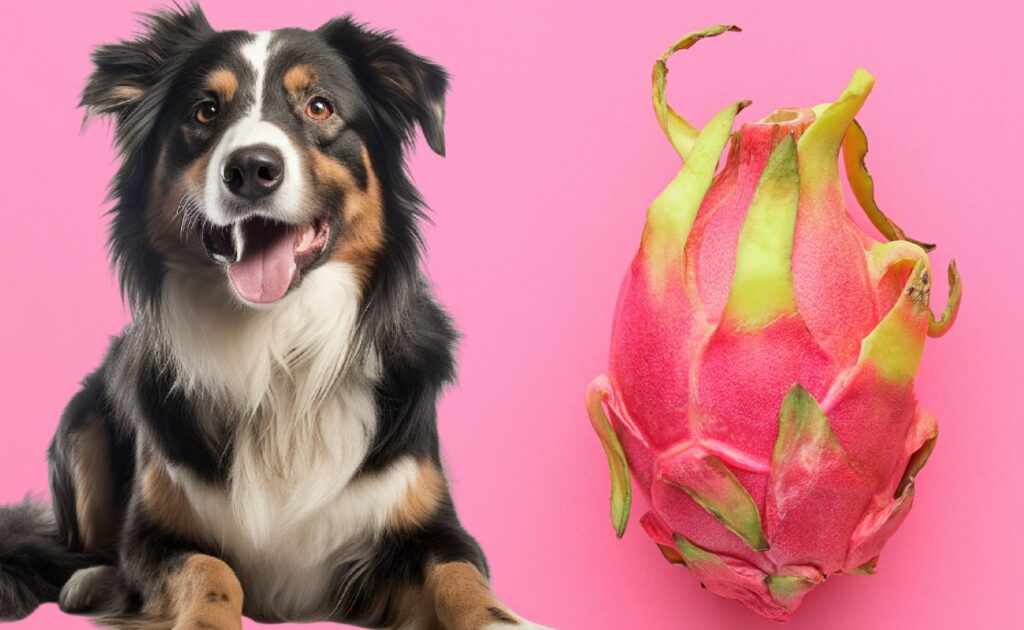
Can Dogs Eat Dragon Fruit? Dragon fruit, also known as pitaya, is a tropical fruit that has gained popularity for its vibrant appearance and numerous health benefits. Pet owners often wonder if this exotic fruit can be safely shared with their furry friends. In this blog, we’ll explore whether dogs can eat dragon fruit and discuss its potential benefits and risks. Nutritional Benefits of Dragon Fruit Dragon fruit is rich in essential nutrients that can be beneficial for both humans and dogs. It is packed with vitamins such as vitamin C, B vitamins, and vitamin E, which help boost the immune system and support overall health. Additionally, dragon fruit contains antioxidants, fiber, and minerals like calcium and magnesium, which can aid in digestion and bone health. For dogs, these nutrients can contribute to a healthier coat, improved digestion, and a stronger immune system. The fiber content in dragon fruit can also help regulate bowel movements and prevent constipation, making it a beneficial treat in moderation. Here is a table of the complete nutritional profile of dragon fruit per 100 grams: Nutrient Amount per 100g Calories 50 kcal Carbohydrates 11 g Dietary Fiber 3 g Sugars 8 g Protein 1.1 g Fat 0.4 g Vitamin C 20.5 mg Vitamin A 1 µg Calcium 18 mg Iron 0.74 mg Magnesium 40 mg Phosphorus 22 mg Potassium 170 mg Sodium 1 mg Vitamin B1 (Thiamine) 0.04 mg Vitamin B2 (Riboflavin) 0.05 mg Vitamin B3 (Niacin) 0.16 mg Vitamin E 0.08 mg Water 90.5 g This nutritional profile highlights the key vitamins, minerals, and macronutrients found in dragon fruit, emphasizing its low-calorie content and rich supply of essential nutrients. Is Dragon Fruit Safe for Dogs? The good news is that dragon fruit is safe for dogs to eat in small quantities. The flesh of the fruit is non-toxic and can be a refreshing treat for your pet. However, it’s important to remove the outer skin and any seeds before offering it to your dog. The skin is tough and can be difficult for dogs to digest, while the seeds, although small, can pose a choking hazard or cause digestive issues. When introducing dragon fruit to your dog’s diet, start with a small amount to ensure they do not have any adverse reactions. Monitor your dog for any signs of allergies or digestive upset, such as vomiting, diarrhea, or excessive itching. Is Dragon Fruit Safe for Dogs? To safely serve dragon fruit to your dog, follow these simple steps: Select a Ripe Fruit: Choose a ripe dragon fruit that is bright in color and slightly soft to the touch. Wash Thoroughly: Rinse the fruit under running water to remove any dirt or pesticides. Peel the Skin: Use a knife to carefully peel off the tough outer skin. Remove Seeds: Slice the fruit and remove any visible seeds. Cut into Small Pieces: Cut the flesh into bite-sized pieces appropriate for your dog’s size. Offer the dragon fruit pieces as a treat or mix them into your dog’s regular food. Always serve in moderation to avoid any potential digestive issues. Potential Risks and Precautions While dragon fruit is generally safe for dogs, there are a few precautions to keep in mind. First, overfeeding dragon fruit can lead to digestive upset, including diarrhea and stomach cramps. Moderation is key to preventing these issues. Additionally, if your dog has a history of food allergies or sensitivities, it’s best to consult with your veterinarian before introducing any new foods, including dragon fruit. They can provide personalized advice based on your dog’s health history and dietary needs. It’s also important to note that not all dogs will enjoy the taste of dragon fruit. If your dog shows no interest in the fruit or rejects it, don’t force them to eat it. There are plenty of other healthy treats available that your dog may prefer. Alternatives to Dragon Fruit If your dog doesn’t take to dragon fruit, there are several other fruits that are safe and healthy for dogs. Some alternatives include: Apples: Rich in vitamins and fiber, but be sure to remove the seeds and core. Blueberries: Packed with antioxidants and easy to serve. Bananas: High in potassium and easy to digest. Watermelon: Hydrating and refreshing, just remove the seeds and rind. Each of these fruits offers its own unique set of benefits and can be a delicious addition to your dog’s diet in moderation. Summary: Can Dogs Eat Dragon Fruit? In conclusion, dogs can eat dragon fruit safely in small amounts. This exotic fruit can provide several nutritional benefits, including vitamins, antioxidants, and fiber. However, it’s essential to remove the skin and seeds and serve the fruit in moderation to avoid any digestive issues. Always monitor your dog for any adverse reactions and consult with your veterinarian if you have any concerns. By introducing dragon fruit and other healthy fruits into your dog’s diet, you can add variety and boost their overall health. Remember, every dog is unique, so what works for one may not work for another. Pay attention to your dog’s preferences and health needs to ensure they enjoy a balanced and nutritious diet. For more tips on dog nutrition and safe treats, be sure to check out our other blog posts. Happy feeding!
Can Cats Eat Okra?
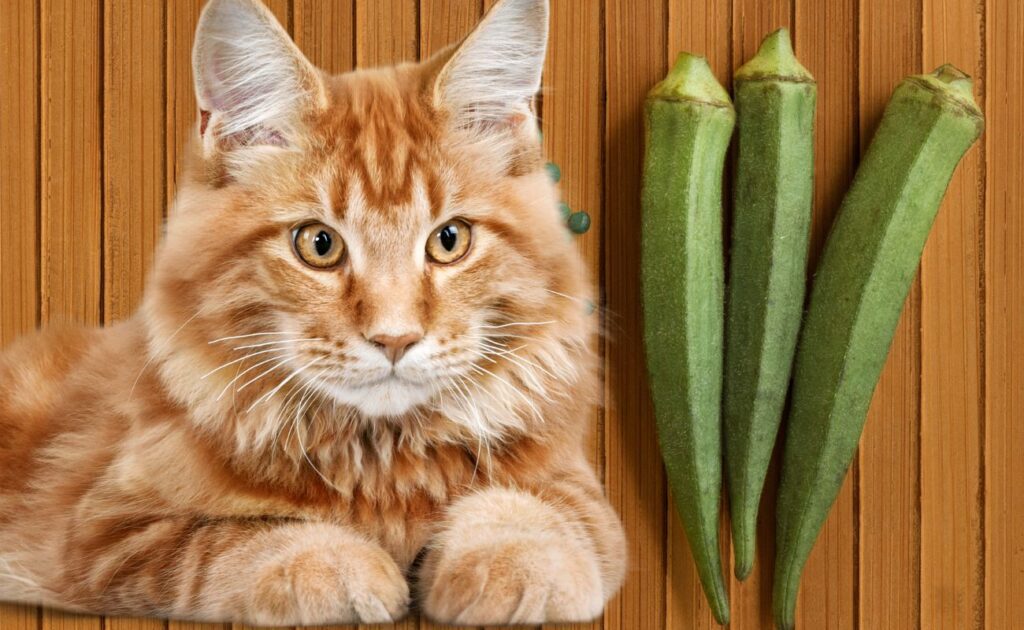
As pet owners, we often wonder about the safety of various foods for our furry friends. One common question is, “Can cats eat okra?” Okra, a nutritious vegetable for humans, has several health benefits, but is it suitable for our feline companions? This blog delves into whether okra is safe for cats, its potential benefits and risks, and how to introduce it into their diet if it’s deemed safe. Is Okra Safe for Cats? Can Cats Eat Okra? Cats are obligate carnivores, meaning their diet primarily consists of meat. However, they can occasionally eat certain vegetables and fruits. Okra is generally safe for cats in small amounts, provided it is cooked and served plain. Raw okra can be tough to digest and may pose a choking hazard. Always consult with your veterinarian before introducing any new food to your cat’s diet to ensure it won’t cause any adverse reactions or interfere with their nutritional needs. Nutritional Benefits of Okra Okra is packed with vitamins and minerals that are beneficial for humans, but what about cats? This vegetable contains vitamins A, C, and K, as well as folate and fiber. While cats do not require these vitamins from plant sources, small amounts can complement their diet. Fiber can aid in digestion, and vitamins can contribute to overall health. However, it’s important to remember that these benefits are secondary to the primary needs of a meat-based diet for cats. Sure! Here’s a table outlining the nutritional profile of okra per 100 grams (approximately one cup of raw okra): Nutrient Amount per 100g % Daily Value* Calories 33 kcal 2% Carbohydrates 7.5 g 3% Dietary Fiber 3.2 g 13% Sugars 1.5 g – Protein 2.0 g 4% Fat 0.2 g <1% Saturated Fat 0.0 g <1% Cholesterol 0 mg 0% Vitamin A 36 µg 4% Vitamin C 23 mg 25% Vitamin K 31.3 µg 26% Folate 60 µg 15% Calcium 82 mg 8% Iron 0.62 mg 3% Magnesium 57 mg 14% Phosphorus 61 mg 6% Potassium 299 mg 6% Sodium 7 mg <1% Zinc 0.58 mg 5% *Percent Daily Values (DV) are based on a 2,000 calorie diet. Your daily values may be higher or lower depending on your calorie needs. This table includes the key nutrients found in okra, making it easier to understand its health benefits for both humans and cats. Potential Risks of Feeding Okra to Cats While okra is not toxic to cats, there are potential risks to consider. Feeding large amounts of okra can lead to digestive issues such as upset stomach, diarrhea, or constipation due to its high fiber content. Additionally, any spices, seasoning, or cooking methods involving oil or butter can be harmful. Always serve okra plain and cooked to avoid these risks. Monitoring your cat for any signs of discomfort or allergic reactions is crucial when introducing new foods. How to Introduce Okra to Your Cat’s Diet If you decide to introduce okra to your cat’s diet, start with a very small amount. Cook the okra thoroughly without any seasoning. Offer a small piece and observe your cat’s reaction over the next 24 hours. If there are no signs of digestive upset or allergic reactions, you can occasionally give your cat small pieces as a treat. However, remember that okra should never replace their regular, balanced diet. Alternatives to Okra for Cats If you’re looking for safe vegetables to include in your cat’s diet, there are alternatives to consider. Carrots, peas, and pumpkin are generally safe and can provide some nutritional benefits. As always, these should be given in moderation and prepared plainly. Consulting with your veterinarian about the best options for your cat’s specific dietary needs is the best approach. Summary: Can Cats Eat Okra? So, can cats eat okra? In small, cooked, and unseasoned amounts, okra can be a safe and occasional treat for your feline friend. However, it should never replace a balanced, meat-based diet. Always monitor your cat’s health and consult with your veterinarian before introducing new foods. By doing so, you ensure that your pet remains healthy and happy while exploring new tastes. Ensuring your cat’s diet is safe and nutritious is essential for their well-being. By understanding which foods are appropriate and how to introduce them safely, you can provide a varied and enjoyable diet for your furry companion.

